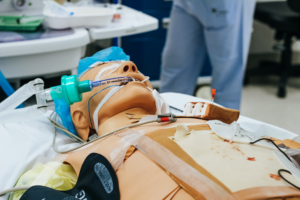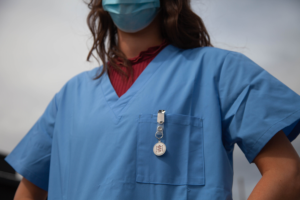
MSN Programs in New York
By EveryNurse Staff on January 16, 2023

Healthcare affiliated employers in the state of New York are always on the lookout for nurses who have earned their Master’s of Science in Nursing (MSN) Degree. These professionals take on advanced roles in the nursing industry, educate future nurses or nurses who are continuing their educations, and manage healthcare facilities of all kinds. Nurses and others who are considering pursuing their MSN will realize numerous benefits as a result, from increased salaries to more opportunities within the nursing industry. The state of New York is a wonderful place to earn a Master’s of Science in Nursing Degree.
Schools With MSN Programs in New York
- Adelphi University’s College of Nursing and Public Health requires applying students to possess a BSN from an accredited, four-year university. They offer several areas of specialization, including Adult/Geriatric Nurse Practitioner, Nursing Administration, Nursing Education, and Healthcare Informatics. Students are also required to be licensed as registered nurses in the state of New York, or eligible to be licensed by endorsement.
- Individuals can choose from several specialties at Binghamton University’s Decker School of Nursing, including Adult/Gerontological Nursing, Family Nursing, Family Psychiatric/Mental Health Nursing and Community Health Nursing. To make it easier for nurses to earn their MSN, the school offers both part-time and full-time study programs. While it’s not required, the school does strongly suggest that applicants have at least 1 year of experience as an RN before joining the MSN program.
- Individuals in or around the Riverdale area can take advantage of the College of Mount Saint Vincent’s Department of Nursing. They offer the traditional MSN program as well as an RN to MSN bridge program. The areas of specialization at this school include Adult Nurse Practitioner, Family Nurse Practitioner, Nurse Administrator and Nurse Educator. Part-time studies are available for individuals who hold a BSN from an accredited, four-year college.
- The College of New Rochelle’s School of Nursing offers a few different pathways to a Master’s of Science in Nursing Degree. The traditional pathway requires students to have a BSN earned from an accredited college or university with an undergraduate GPA of 3.0 or more. They also offer the BSN to MSN route or the RN to MSN route. Specializations at this school include Family Nurse Practitioner or Clinical Nurse Specialist in Holistic Nursing. Applicants must hold a current RN license in good standing in the state of New York.
- Those who are in or around the Staten Island area can take advantage of the College of Staten Island – CUNY Department of Nursing. Their MSN program prepares nurses by training them in advanced practice specialties like Adult Clinical Nurse Specialist and or Nurse Practitioner, as well as Gerontological Clinical Nurse Specialist and or Gerontological Nurse Practitioner. Like most schools, applicants are required to hold a BSN from an accredited college or university, along with a cumulative GPA of 3.0.
- Columbia University’s School of Nursing boasts a couple of different MSN pathways, including the traditional BSN to MSN program. They offer up several specializations, including Nurse Anesthesia, Nurse Midwifery, Pediatric Primary Care Nurse Practitioner, Women’s Health Nurse Practitioner, Adult-Gerontology Acute Care Nurse Practitioner, Family Nurse Practitioner, and Adult-Gerontology Primary Care Nurse Practitioner. There is also a direct entry program for those with a bachelor’s degree in another field.
- Located in Amherst, Daemen College’s Department of Nursing allows individuals to take one of two pathways to their MSN degree. The first is the traditional method, for those who have already earned a Bachelor’s of Science in Nursing. With this path, individuals can specialize in Adult-Gerontology Primary Care Nurse Practitioner, Nurse Education and Nursing Executive Leadership. The second is the RN to MSN accelerated pathway. With this route, individuals can specialize in Adult Nurse Practitioner. Applicants for the traditional pathway must hold a BSN degree from an accredited college or university and applicants for the RN to MSN program must hold a nursing diploma or Associate’s degree in nursing.
- Those in or around Buffalo can take advantage of the D’Youville College School of Nursing.This school boasts a variety of specializations, including Family Nurse Practitioner, Community Health Clinical Nurse Specialist, Informatics, Care of the Homeless Nursing and much more. Only those who hold a BSN degree from an accredited college or university will be eligible to participate and should have a cumulative GPA of 3.0.
- Excelsior College’s School of Nursing allows individuals to specialize in one of three areas on the journey to their MSN degree: Clinical Systems Management, Nursing Education and Nursing Informatics. The college is flexible and offers both part-time and full-time study programs, as long as individuals complete at least 2 courses per year. All applicants must possess a BSN degree from an accredited program and must have an unencumbered RN license.
- For those in the Big Apple, the CUNY Hunter-Bellevue School of Nursing allows individuals who are pursuing their MSN degree to choose one of numerous specializations: Adult Health Clinical Nurse Specialist, Clinical Nurse Leader, Community/Public Health Nursing, Gerontological/Adult Nurse Practitioner and more. Applicants should have an unencumbered RN license in the state of New York as well as hold a BSN degree from an accredited college or university, with a cumulative GPA of 3.0 or higher.
- Le Moyne College’s Department of Nursing boasts an excellent MSN program where individuals can choose between two specializations: Nurse Educator or Nurse Administrator. There are also a couple of different pathways to choose, including the traditional method for those who have already earned their BSN degree. The traditional program is a 39-credit hour program which is designed to take two years to complete. There is also the RN to MSN pathway for registered nurses who have a non-nursing Bachelor’s degree. Those individuals must have a diploma or Associate’s degree in nursing as well as their Bachelor’s.
- CUNY Lehman Department of Nursing offers up the traditional MSN program for those who have already earned their BSN from an accredited college. Students can choose to specialize in Advanced Nursing, Parent-Child Nursing, Adult Health Nursing, Nursing of Older Adults, Family Nurse Practitioner or Pediatric Nurse Practitioner. All applicants must have a BSN degree and a cumulative GPA of 3.0 or higher on a 4.0 scale. It’s also important that they have completed a graduate-level Statistics course.
- The School of Nursing at Long Island University offers two different MSN programs at their Brooklyn campus and C.W. Post campus. The traditional route (BSN to MSN) is offered, as well as the RN to MSN bridge program for registered nurses who hold an Associate’s degree in nursing. This 160-credit hour program offers the specialization of Adult Nurse Practitioner. For the traditional method, individuals can specialize in one of the following roles: Adult Nurse Practitioner, Family Nurse Practitioner, Geriatric Nurse Practitioner and Nurse Educator.
- The Mercy College Department of Nursing is another school offering two MSN pathways; the traditional pathway for those who have already earned their BSN degree and the bridge pathway for RNs who hold an Associate’s degree in nursing. Students can specialize in Nursing Administration or Nursing Education, and both programs are designed to take two years to complete. There is a part-time study program allowed for those who are working while earning their degree.
- For individuals in or around Rockville Centre, Molloy College’s Division of Nursing features a wide range of MSN specializations, including Nursing Education, Nursing Administration with Informatics, Adult Health Clinical Nurse Specialist, Adult Nurse Practitioner, Psychiatric/Mental Health Nurse Practitioner, Pediatric Nurse Practitioner, and Family Nurse Practitioner. The program requires 42 to 48 credits to complete, depending upon your specialty. Applicants are required to have a BSN degree from an accredited university or college as well as an undergraduate GPA of 3.0 or higher.
- Those in the area of Newburgh can take advantage of Mount Saint Mary College’s Division of Nursing which offers a great MSN program with two specialties: Adult Nurse Practitioner and Family Nurse Practitioner. The credits required to complete these programs is between 42 and 45 credit hours, depending on the specialization. In order to be included in the program, individuals must hold a BSN from an accredited nursing program and must have an undergraduate GPA of 2.75 or higher.
- New York University College of Nursing offers up the traditional MSN program for individuals who currently have a BSN as well as the RN to MSN bridge program. Participants of both programs can choose from several specializations, including Adult Acute Care, Adult Primary Care, Family Nurse Practitioner, Mental Health Nursing, Pediatric Nursing, Nurse-Midwifery, Nursing Administration, Nursing Education or Nursing Informatics. For those participating in the RN to MSN program, individuals must have a New York State nursing license and at least one year of clinical nursing experience.
- Those near Pleasantville can take advantage of the Leinhard School of Nursing at PaceUniversity. This program offers up three different pathways for earning an MSN: the traditional pathway, the RN to MSN bridge program and the Direct Entry option. The specialization available at this school is Family Nurse Practitioner, and it requires 42 credit hours to complete.
- Roberts Wesleyan College’s Department of Nursing provides two MSN specialization options: Nursing Education and Nursing Leadership and Administration. Only applicants who have a BSN from an accredited program will be considered for the MSN program. They must also have a cumulative undergraduate GPA of 3.0 and must have completed a Statistics course.
- Saint Joseph’s College of Nursing, located in Syracuse, offers a fantastic MSN program. Students can choose between three specialties, including Nursing Administration, Nursing Education and Family Nurse Practitioner. There is a traditional MSN program and the school also offers an RN to MSN bridge program for those who hold a diploma or Associate’s Degree in nursing. The credit hours required to earn the MSN are 42-48 depending upon the specialization chosen.
- John Fisher College offers up their Wegman’s School of Nursing, and several different MSN specializations. Those participating can choose between Clinical Nurse Specialist Maternal/Child, Clinical Nurse Specialist Adult/Gerontology, Family Nurse Practitioner, and Nurse Educator. Only applicants who currently hold a BSN degree in nursing from an accredited college or university will be chosen to participate. There are also a few different required undergraduate courses, including Statistics, Nursing Research, Health/Physical Assessment and these must have been completed with a B or higher.
- The SUNY Downstate Medical Center’s College of Nursing allows individuals to choose between several MSN programs, including Clinical Nurse Specialist, Nurse Anesthesia, Nurse Midwifery, Family Nurse Practitioner and Women’s Health Nurse Practitioner. In order to be considered for the program, individuals must currently hold a BSN from an accredited university or college, and must have earned an undergraduate GPA of 3.0 or higher. They must also have an unencumbered New York State RN license and one year of clinical experience.
- The SUNY Institute of Technology at Utica-Rome’s Department of Nursing and Health Professions boasts an excellent MSN program and allows individuals to choose between numerous specializations: Adult Nurse Practitioner, Family Nurse Practitioner, Gerontological Nurse Practitioner, Nursing Administration and Nursing Education. All individuals applying for the program must have a BSN degree from an accredited university and must have completed a course in Statistics.
- SUNY Upstate Medical University’s College of Nursing features both a traditional MSN program and an RN to MSN pathway for those who have a diploma or associate’s degree in nursing. There are a few different specializations that students can choose from, including Pediatric Nurse Practitioner, Family Nurse Practitioner, Family Psychiatric/Mental Health Nurse Practitioner and Clinical Nurse Specialist. All applicants for the bridge program must have a nursing diploma or Associate’s degree and applicants for the traditional program must have a BSN from an accredited college or university.
- Those located in the Stony Brook area can take advantage of the Stony Brook University School of Nursing, where a traditional MSN program is offered as well as an RN to MSN bridge program. Specializations offered here include Nursing Education, Nurse Midwifery, Adult/Gerontological Nurse Practitioner, Perinatal/Women’s Health Nurse Practitioner, Neonatal Nurse Practitioner, Pediatric Nurse Practitioner, and Psychiatric/Mental Health Nurse Practitioner. Like most programs, all applicants must currently hold a BSN from an accredited program or a Bachelor’s degree in another field for the RN to MSN bridge program.
- Russell Sage College boasts a traditional MSN program as well as an RN to MSN bridge program for students who have a diploma or Associate’s degree in nursing. This school offers up several different specializations, including Adult Clinical Nurse Specialist, Community Clinical Nurse Specialist, Psychiatric Clinical Nurse Specialist, Adult Nurse Practitioner, Family Nurse Practitioner, Gerontological Nurse Practitioner, Psychiatric/Mental Health Nurse Practitioner, Adult Health Nurse Educator and many more. All programs will require between 39 and 49 credits for completion.
- SUNY University at Buffalo School of Nursing offers students the opportunity to earn their MSN degree, specializing in Nursing Leadership in Health Care Systems. This particular specialization prepares nurses to take on middle and upper level management roles within healthcare settings. Those who apply must have a BSN degree with an undergraduate Grade Point Average of at least 3.0 to be considered for the program.
- Individuals in the Rochester area can take advantage of the University of Rochester School of Nursing and their many flexible MSN options. They offer a traditional MSN pathway as well as an RN to MSN bridge program and a Direct Entry program. All students have the opportunity to train for careers as Acute Care Nurse Practitioners with concentrations in Cardiovascular or Critical Care, Family Nurse Practitioners, Adult/Geriatric Nurse Practitioners, Pediatric Nurse Practitioners, and Psychiatric/Mental Health Nurse Practitioners.
- The Evelyn L. Sprio School of Nursing at Wagner College allows individuals to train through the traditional MSN route or through the RN to MSN bridge program. Students can choose from two specializations: Family Nurse Practitioner or Nurse Educator. Programs require between 44 and 45 credit hours to complete, and study is available on a part-time or full-time basis.
New York MSN Checklist
- Earn your license as a Registered Nurse (RN) in the state of New York.
- Enter the accredited MSN degree program of your choice and focus on your desired specialty.
- During schooling, fulfill any supervised clinical hours requirement.
- Apply for licensure through the New York State Board of Nursing and pay the appropriate fees ($85).
- Pass the Family Nurse Practitioner Examination for New York.
New York MSN Salary & Job Outlook
Those holding an MSN degree in the state of New York have a variety of options as far as careers, from becoming nurse practitioners to practicing nurse midwifery. The Bureau of Labor Statistics reports on the salary data for these professionals, and as of May 2013, nurse practitioners earned an annual median salary of $100,420, nursing instructors and teachers earned an annual median salary of $81,240, medical and health services managers earned an annual median salary of $118,020 and nurse midwives earned an annual median salary of $97,750.




